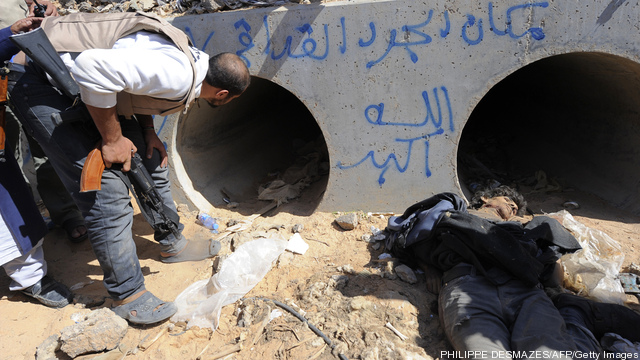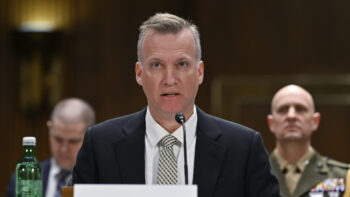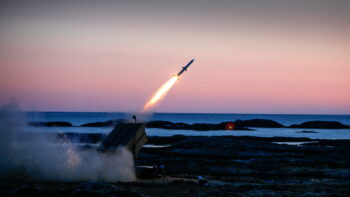 With news of Muammar Gaddhafi’s death, the U.S., NATO, and the Libyan National Transitional Council (NTC) deserve a moment to relish in the successes of the democratic movement in Libya. Yet it’s important to understand that despite this success, the story of Libyan democracy is in its infancy. Now begins the difficult part.
With news of Muammar Gaddhafi’s death, the U.S., NATO, and the Libyan National Transitional Council (NTC) deserve a moment to relish in the successes of the democratic movement in Libya. Yet it’s important to understand that despite this success, the story of Libyan democracy is in its infancy. Now begins the difficult part.
Can the NTC establish rule of law, democratic institutions, security, a stable economy, and a functioning government for the whole of Libya? This is traditionally the most difficult part of any revolution.
At this point, it’s wise to step back for a moment and reflect upon some of the lessons learned, and how those lessons can help guide future U.S. or NATO involvement in future scenarios of intervention.
- Revolutions do not succeed against authoritarian regimes when the regime holds a monopoly over the application of violence. The monopolization of the use of force is a key element in the legitimacy of a government, whether democratic or dictatorial. In cases where the Arab Spring has been successful, the military has divided, backed the protesters or remained neutral.
In Egypt, the military remained “neutral” during the revolutionary fervor. By refusing to open fire on protesters, the military’s decision led directly to the ouster of Hosni Mubarak. In Tunisia, the Chief of the Army refused direct orders to shoot protesters, and the army withdrew from defensive positions in the capital.
In contrast, Bashar al-Assad has maintained his monopoly of force in Syria, brutally stamping out pockets of protesters. The 2009 Iranian Green Revolution, essentially a forerunner of the Arab Spring, also fell apart at the hands of a regime unfettered by the moral challenges of crushing unarmed protests.
- The U.S. does not have to put troops on the ground. Sending hundreds of thousands of American or NATO troops into a foreign country will not in itself establish democracy. Rather, it takes the political desire and will of the population to do so. Tunisians, Egyptians, and Libyans all reached the decision to put their lives on the line for what they believed, creating an environment in which NATO was poised to assist.
- On second thought, maybe a few troops would have been a good idea. That doesn’t mean troops should have participated in the fighting, but would have instead been useful for securing the vast numbers of arms left abandoned by the Gaddafi regime. We simply do not yet know how many manned portable air defense systems (MANPADS) have been looted from arms depots. These types of weapons pose a serious threat, especially towards civilian aviation. According to the U.S. State Department, 40 civilian aircraft have been hit in MANPADS attacks since the 1970s. Additionally, Libyan rebels also happened upon an unguarded stockpile of yellow cake uranium that had yet to be turned over to the international community. Though unrefined and not yet dangerous, an effort to secure that material would have been comforting.
- NATO has shown weaknesses that need to be addressed. The most notable, if not embarrassing news coming out of the NATO mission over Libya was the story that NATO was running very low on certain types of precision-guided munitions. This is rather worrying; considering that militarily, Libya was no match for NATO, how could NATO expect to maintain sufficient munitions for other potential conflicts? It seems NATO faces a supply chain issue. As the British and French often buy munitions in “batches,” factories must “retool” and restart idle production lines in order to restock. Furthermore, many European aircraft are not physically equipped to carry alternative American munitions. Given that the organization has historically focused on interchangeability of ammunition, this is unacceptable.
- Air power works, but it doesn’t. In the case of Libya, air power could not have worked alone to create a desired outcome. Rather, air power has been a necessary component in bringing about a result in NATO’s favor. Without the presence of a significantly large and willful indigenous group on the ground taking advantage of the air strikes and holding territory, it’s doubtful that anything significant would have come from the NATO mission. A widespread desire for change existed on the ground in Libya-airpower was merely a means of accomplishing it.
- Things can actually get done in the U.N., but we’ve set a precedent that may not be repeated. The efforts of the United States, Britain, France, and other allies to create a legal basis for intervention worked. The U.N.’s authorization of NATO operations in Libya created the official legitimacy and moral authority for applying force. But despite what was accomplished through the U.N., it may be exceedingly difficult to do this again. Both Russia and China, citing a variety of concerns including limits to the mission, abstained from the vote to authorize UN Resolution 1973, which established a no-fly zone over Libya.
But due to this deliberate manipulation of the U.N. resolution by NATO, it is more likely that China or Russia will exercise veto power should a similar situation arise in the future.
- Everybody has a gun! But the problem isn’t just that there are tens of thousands of assault rifles in the hands of the general population. The revolution in Libya has been characterized by a Mad-Max army of pickup trucks, SUVs, and other vehicles mounting everything from anti-aircraft weapons to BMP turrets. If anything, Libyan welders have shown an impressive array of skills and ingenuity, creating a mechanized force of “technicals” with which the rebel movement swept the vast distances between Libyan cities.
There must be viable options made to the rebel forces, whether that’s integrating them into a properly organized, trained, and professional military, or some sort of collection and accounting of weapons as people return to their normal lives. The international community bears a great responsibility in assisting the NTC with this process.
- There will still be Gaddafi supporters in Libya after the revolution has ended. In drafting a new constitution for Libya, the NTC will have to create an inclusive government in accordance with the reality that these people are still around. There must be a constitutional process for opposition within the framework of a new Libyan government. If the NTC is unwilling or unable to create a process by which former regime loyalists can have their voices heard without having to resort to violence, it is likely that a number of these loyalists may create an atmosphere of instability that threatens to destroy the hopes of democracy. And in a democracy, the people you don’t like have a voice, too.
Multi-ship amphib buy could net $900M in savings, say Navy, Marine Corps officials
Lawmakers gave the Navy authorities to ink a multi-ship amphib deal years ago, but the service has not utilized that power yet.


























